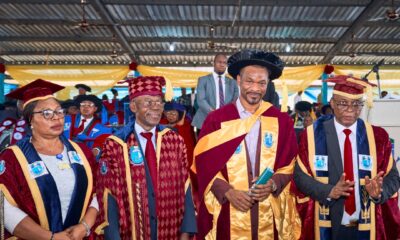News
Human Rights Watch’s Report Reveals Saddening Cases of Rape & Sexual Exploitation by Government Officials in IDP Camps | President Buhari Calls for Action
President Muhammadu Buhari has called for action on a report by Human Rights Watch that accused of raping and sexually assaulting women and children in the Internally Displaced Persons (IDP) camps in the North East.
“Government officials and other authorities in Nigeria have raped and sexually exploited women and girls displaced by the conflict with Boko Haram. The government is not doing enough to protect displaced women and girls and ensure that they have access to basic rights and services or to sanction the abusers, who include camp leaders, vigilante groups, policemen, and soldiers,” the group had said in a statement on Monday.
The group said that it documented 43 cases of sexual abuse, including rape and exploitation, of 43 women and girls living in seven internally displaced persons (IDP) camps in Maiduguri, the Borno State capital.
“Four of the victims told Human Rights Watch that they were drugged and raped, while 37 were coerced into sex through false marriage promises and material and financial assistance. Many of those coerced into sex said they were abandoned if they became pregnant. They and their children have suffered discrimination, abuse, and stigmatization from other camp residents. Eight of the victims said they were previously abducted by Boko Haram fighters and forced into marriage before they escaped to Maiduguri,” the group added.
The report continued:
A situational assessment of IDPs in the northeast in July 2016 by NOI Polls, a Nigerian research organization, reported that 66 percent of 400 displaced people in Adamawa, Borno, and Yobe states said that camp officials sexually abuse the displaced women and girls.
Women and girls abused by members of the security forces and vigilante groups – civilian self-defense groups working with government forces in their fight against Boko Haram – told Human Rights Watch they feel powerless and fear retaliation if they report the abuse.
A 17-year-old girl said that just over a year after she fled the frequent Boko Haram attacks in Dikwa, a town 56 miles west of Maiduguri, a policeman approached her for “friendship” in the camp, and then he raped her.
“One day he demanded to have sex with me,” she said. “I refused but he forced me. It happened just that one time, but soon I realized I was pregnant. When I informed him about my condition, he threatened to shoot and kill me if I told anyone else. So I was too afraid to report him.”
President Buhari, in a statement signed by his Media and Publicity aide, Garba Shehu, said that he is worried and shocked by the report. The statement read:
President Muhammadu Buhari is worried and shocked by the recently released Human Rights Watch (HRW) report which alleges sexual abuse and exploitation of women and girls in camps for those displaced by the Boko Haram insurgency.
The welfare of these most vulnerable of Nigerian citizens has been a priority of his government. Nigerians and the international community can rest assured that the allegations raised in the HRW are not being taken lightly. President Buhari has instructed the Inspector General of Police and the state governors of the affected states to immediately commence investigations into the issue. Their findings will determine the next course of action for the government and define an appropriate response. While the Nigerian military continues to work hard so that these unfortunate victims of Boko Haram terrorism can soon return safely to their homes, the government will do its best to ensure their protection and welfare in the temporary IDP camps.
Here are some cases highlighted in the report:
Rape
A 16-year-old girl who fled a brutal Boko Haram attack on Baga, near the shores of Lake Chad, northern Borno in January 2015, said she was drugged and raped in May 2015 by a vigilante group member in charge of distributing aid in the camp:
He knew my parents were dead, because he is also from Baga. He would bring me food items like rice and spaghetti so I believed he really wanted to marry me. But he was also asking me for sex. I always told him I was too small [young]. The day he raped me, he offered me a drink in a cup. As soon as I drank it, I slept off. It was in his camp room.
I knew something was wrong when I woke up. I was in pain, and blood was coming out of my private part. I felt weak and could not walk well. I did not tell anyone because I was afraid. When my menstrual period did not come, I knew I was pregnant and just wanted to die to join my dead mother. I was too ashamed to even go to the clinic for pregnancy care. I am so young! The man ran away from the camp when he heard I delivered a baby six months ago. I just feel sorry for the baby because I have no food or love to give him. I think he might die.
An 18-year-old girl from Kukawa, a Borno town 112 miles from Maiduguri, the state capital, said that a member of Civilian Joint Task Force – a self-defense vigilante group working with government forces in their fight against Boko Haram – initially gave her privileges, including passes that allowed her to leave the camp, but then raped her:
The man started with preaching, telling me to be a good Muslim girl and not to join bad groups in the camp. He then sent his mother to propose to me, which convinced me that he was serious. He allowed me to go outside the camp when necessary. When he asked me to visit his newly allocated room in the camp, I didn’t see any reason not to go because I felt safe with him. He gave me a bottle of Zobo [locally brewed non-alcoholic drink] and I immediately felt dizzy and slept off. I don’t know what happened thereafter but when I woke up he was gone and I was in pain and felt wet between my legs. For three days I could not walk properly.
Some weeks later I fell very ill, and was told at the hospital that I was pregnant. Then everyone turned away from me: [He] refused to help me, and my step-mother who I lived with in camp pushed me out, saying I was a disgrace. I reported [him] to the police in camp several times but they have not done anything to him because they work together. Whenever I see him, I wish something terrible will happen to him. It is because of him that I have lost everything. I don’t even think the baby will last because she is always crying and I can’t cope. I pray that God will forgive me for neglecting the baby but I am helpless.
Sexual Exploitation
A 30-year-old woman from Walassa, near Bama, about 43 miles west of Maiduguri, said that she fled into a nearby wooded area after Boko Haram fighters killed her husband and abducted her daughters, ages 12 and 9. She stayed there for three months, hoping to find a way to rescue her daughters, until Nigerian government soldiers arrived in the area and the fighters escaped with their captives:
A few weeks after soldiers transported us to the camp, near Maiduguri, one of the soldiers guarding us approached me for marriage. He used to bring food and clothes for me and my remaining four children, so I allowed him to have sex with me. He is a Hausa man from Gwoza. That is all I know about him. Two months later he just stopped coming. Then I realized I was pregnant. I feel so angry with him for deceiving me. When he was pretending to woo me he used to provide for me, but as soon as I agreed and we began having sex, his gifts began to reduce until he abandoned me. Now my situation is worse as the pregnancy makes me sick, and I have no one to help me care for my children.
A woman from Bama living at the same camp said:
The soldier showed his interest by bringing me food and clothes. He used to wear the green army uniform and carried a gun. I accepted him because I needed help to take care of me and my four children. Feeding in the camp is only once a day so you have to accept any help that comes. We started having sex in my camp tent – my sister who was sharing it with me left – or at night in the open field where soldiers stay in the camp. Five months later when I realized I was pregnant and told him, he stopped coming. I have not seen him since then. I feel so ashamed because my neighbors talk and stare at me. I cry whenever I think about him. I delivered the baby two months ago but he is also suffering – I eat once a day so [am] not producing enough milk to breast feed him well. Things are so bad in the camp, there is not enough water or food.
An 18-year old girl from Baga said when she met a member of the Civilian Joint Task Force in the camp, she felt she could trust him because he is also from Baga:
He took me from the camp to a house on Baga Road so we could meet freely. I stayed with him in that house for about one month. Then I fell ill, and went to a clinic. The people at the clinic asked for the person I was living with, and invited him. That was when they told him I was pregnant, and he accepted the pregnancy. But immediately [when] we came out of the clinic he took me to a man to abort the pregnancy. I refused and he said if I would not abort we should separate. Then I moved to the camp. I gave birth almost a year ago but the man has refused to take responsibility. Some months ago he followed the military to catch Boko Haram far from Maiduguri. Even when he visits his two wives in the camp he never asks for me and my baby. I go outside the camp to beg so that we can survive.
A 25-year-old woman at from Dikwa said that when she fled Boko Haram’s attack on the town, she lived with her brother in a rented apartment in Maiduguri. When he was no longer able to feed her and her three children, he took her to the camp where he handed her over to camp elders. One of these elders, a local government employee – who are often financially better off than most displaced people because they receive salaries – proposed marriage and regularly brought her food and money. But the marriage did not materialize, and he began to shun her when she became pregnant. He continued to ignore her when she delivered twins and asked him for money to pay for her midwife. The woman said:
If I have a gun, I will shoot him. It is because of him that people call me and my babies names. I am so ashamed that I cannot participate in camp activities and keep to myself because of the jeers.
A 17-year-old girl said that a young man she knew took her home to his grandmother when she arrived Maiduguri from Dikwa in mid-2014:
He told me he wanted to marry me, and his grandmother referred to me as her grandson’s wife. I lived with them, cooking and cleaning the house, until a month later when he disappeared for weeks. The grandmother asked me to leave, promising to come to the wedding… It was a lie. I did not know it but I was already pregnant. Maybe she already saw the pregnancy signs and I was too young to understand. I heard the grandson fled the town because he heard I have given birth. Now I have been left alone to fend for the baby. I don’t know if any other member of my family survived the Boko Haram attack on Dikwa.
Restricted Movement
A 32-year-old woman from the Damasak said:
Life is terrible here in this camp. For the past three days we have not eaten because there is no firewood to cook the food. To make it worse, they will not even allow us to go out to fend for ourselves. Most times you have to beg the camp officials to intervene with the guards before they will give you the pass to go out. Why will you refuse if any of those people ask you for marriage? You have to survive.
Another camp resident, a 47-year-old mother of eight from Abadam, a northern Borno town, said:
We used to get food at least twice a day when I first arrived at the camp in 2014. But now, sometimes we get nothing at all. We can’t even buy food ourselves because they will not let us go out. My relatives in the town have to plead with camp officials for hours before the officials will agree to let them give us some money or foodstuff from the little they have.
A 20-year-old widowed mother of one at a camp for displaced people said:
I have been refusing marriage proposals from the men in camp because I see how they are deceiving others. I am just not sure how long I can remain in this situation. The last time I ate was four days ago when the one cup of maize I was given finished. I am suffering because I have no husband or anyone else to assist me.
A 16-year-old single mother of one in the same camp said:
Life is difficult in the camp, hardly enough to eat. There is food but whoever gets it, gets it. We are not allowed to go out to find work or get extra food. Sometimes I go to the kitchen to scrape pots to get something to eat. They distribute tickets, some get tickets and some don’t get. If you don’t get a ticket you get no food. The IDP elders distribute the tickets, so they distribute amongst themselves, they make sure their families get first. Usually distribution of tickets take place at odd times such as at midnight.
If you are not married, you hardly get anything that comes in. Women who have husbands insult us: “If you want to eat in [this camp], you should get married in [the camp] so husbands can get food for you.”
Read the full report HERE.






















